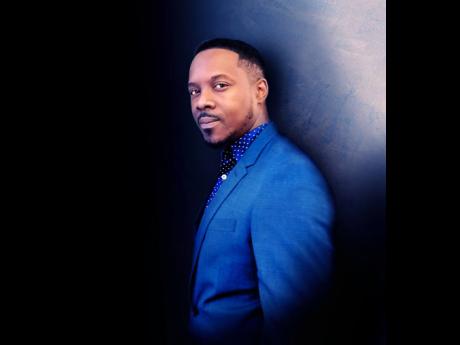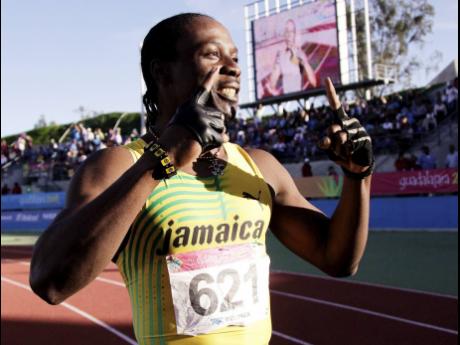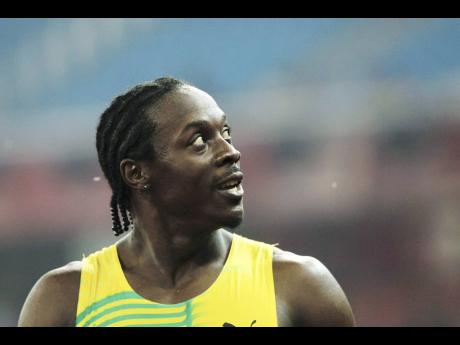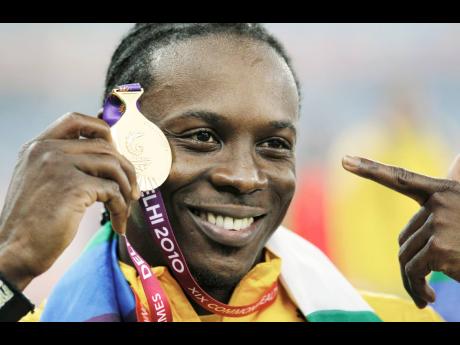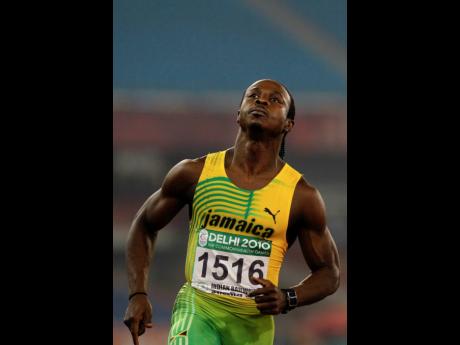Lerone Clarke | My thoughts on Ja’s male sprinting decline
Many of you may know of me, many of you probably don’t. So, let me introduce myself.
My name is Lerone Clarke, a former sprinter for Jamaica. I ran the 100m and the 60m dash indoors and outdoors competitively. I have represented my country for over 12 years. I was always a fast athlete as a student of William Knibb Memorial High School, but I was never one of the schoolboy sensations who made an impact at Champs.
I, however, came into track and field success on the national stage, while attending and competing for G.C. Foster College, a few years later. I then attended Lincoln University in Missouri, USA, where I competed at the NCAA DII level. I had a successful student-athlete and national track and field career.
I also had a great professional athletics career amassing two major titles, the 2010 Commonwealth Games and 2011 Pan-American Games gold medals and a national record in the 60m, before retiring in 2014.
Of course, all of this was somewhat overshadowed by the achievements of teammate, the great Usain Bolt.
So, what gives me the right to write this article? I would say, the same qualifications explained in my introduction. So, let us look at the situation a little closer.
A few short years ago, we saw Jamaica’s ‘Sprint Factory’ pushing out several high-performing male athletes, including myself, consecutively each year. These included names such as Asafa Powell, Michael Frater, Nesta Carter, Nickel Ashmeade, Warren Weir, just to name a few. We were at a point where up to six to seven men had a personal and season best of under 10 seconds and another select number who were able to run under 10.2 seconds at the National Championships each year.
We also had a surge in the 200m performances with at least five people, who could run under 20 seconds, all led by the big man himself, Bolt. This select group of sprinters did not only last for a year, but over an extended period, from 2008 to 2016. That is a long time.
One could argue that everything must come to an end at some point, but I disagree. While that may be true in some aspects, the sharp decline of our male sprinting prowess is too obvious to ignore. It is fair to say that we have witnessed a sharp decline since the retirement of Bolt. Are we not as motivated, since Bolt’s absence? Or is it the lack of funding?
INCREDIBLE COACHES
I pose these questions because to my knowledge, we still have the same incredible coaches, who are still mentoring our newer, younger athletes and getting them ready for these major events. The record of achievements of our Jamaican coaches is impeccable, as proven through the success of our athletes. So, it is my opinion, that with this massive ongoing accumulated experience, we should’ve seen more consistency in performances and the production of newer athletes into the elite level, than we’ve seen over the past few years.
Let us look at one of the fastest persons to ever run the 100m, Yohan Blake, who has a PB of 9.69 seconds. Since his injury in 2013, he has not returned to the top form that we’ve seen. To take nothing away from his talent and success, he is still a sub-10 elite athlete to this day and is the best Jamaican sprinter since Bolt. So that is not what is wrong here. What we need to observe is that no one has stepped up to challenge Blake for the national title, since the departure of Bolt.
Instead, what we have seen is a decline in the quality of sprinters that are supposed to be challenging at the National Championships and an almost non-representation in the latter rounds, at the international level. We have also seen a decline of our talented sprinters on the medal podium at all international championships.
Now I’m not writing this with any claims that I would’ve been able to run much faster than I’ve ran throughout my career. Not at all. After all, I myself have failed to make a few major teams in my career, for the flat event and the relays. I have even lost titles that I was supposed to win. Which is a perfect example of the depth of sprinters we had to select from, during my competitive years. I’m simply challenging the factors that are causing this sharp decline in available fast athletes.
There was a short period following my departure from the sport when a few prominent athletes rose up to the occasion. Some of the noticeable ones were, Andrew Fisher, Kemarley Brown and Jacques Harvey, two of whom ran under 10.0 seconds, and the latter, under 10.10 seconds, over the 100m. This was a sign of hope for Jamaica’s continuous sprint dominance. It was a sign that we could continue to stand on the podium, dominating the flat events and the sprint relays for years to come even after the rest of us retired or no longer performed at our best.
The reality, however, proved to be different.
We saw Jamaica took its first major talent drain in several years when the three mentioned above switched allegiance and represented other countries. This move may have been an excellent move for those athletes, but a devastating one for Jamaica’s athletics, regardless of how well they are performing for their new countries today.
I say this because this one thing is true, that we are usually easily influenced by numbers. This means that when there are a lot of people performing well, even more will begin to do well. The more athletes we had to choose from, meant a greater possibility of dominating the sprints, at any major championships. At this point, the greatest sprinter is gone, and the rest of us from that era also have gone from the sport, in one way or the other. So now it seems there is only one, Yohan Blake.
EXISTING DISCONNECT
We know, however, that this is not necessarily true, as we have enough talent in Jamaica to produce the greatest athletes for years to come. We see proof of this every year at Champs. It does, however, seem like there’s a disconnect between when most of our athletes leave high school and attend colleges or join a club. Many are not improving as they should. How can we now move forward to help all our athletes, including Yohan Blake, to improve upon their current talent and lead better careers as an athlete?
While I understand better than most that every athlete must travel their own journey when it comes to the success they will have on the track, we should not ignore the factors that lead to this decline.
As an athlete, the pressure to represent one’s country is a huge responsibility. We train hard for long hours and compete at high intensity for only minutes or seconds. Seconds, that will determine if you will be honoured as one of the best or thrown aside as just not good enough or average. It is not for the weak, especially when you are competing at the senior level. We all have various factors against us as adults, who are trying to lead a normal life while maintaining a consistent training and competitive regime. Often, this is a gruelling task, as most of us will have to balance school, family and a day job, while training at unbelievable intensity. This is so, as many track athletes are not paid enough, to be able to live off those earnings. Throughout the entire world, the sport is not yet setup where all athletes can have significant yearly salaries. Only a select few, separated by milliseconds, may have such luxury of being paid to such extent.
Most of us understand that on a whole, how much money one athlete earns from a sponsorship versus another is still all business. Which means, the sponsors will have their own best interest at heart first and foremost. This is not always the most beneficial to the athlete.
The only way you would make a significant living is if you are the fastest person in the world or have a genius, hard-working team, working on deals for you. Many athletes of past and present have represented their countries well and still live on poverty lines due to not having earned enough to save or invest.
SEPARATED BY MILLISECONDS
So, this leads me back to my earlier point that often in the 100m, this level of excellence is only separated by milliseconds. The deciding factor on if you will be paid well or not paid at all comes down to that one moment on the track, for under 10 seconds. The winner, who is usually the best and usually already earning a substantial salary, will again take all, while the losers walk away with a few dollars of prize money and some pride.
This may demoralise some from training hard enough to compete at their best, while others will find motivation to push even harder. For them, the ones who lost, most times, they have no solid sponsorship to help make training a little bit easier. Such is the situation that leads to some of our athletes switching allegiance, to represent other countries so that they may be able to have an additional source of income, through being paid by these countries to represent them.
There are many like myself, who never wanted to represent any other country other than the one I was born and raised in, regardless of not earning a lot. Many will not think the same and will either choose to leave or stay but are not able to perform well due to the highlighted circumstances.
I am a believer that representing your country should be the pride and joy of all, which goes beyond money of course. However, this alone cannot help these adults compete at their best. There are too many moving parts that need financial attention for the athlete to remain focused and consistent. These include, paying for coaching, training facilities, supplements, treatments, living accommodations, travel and food.
I do not have all the answers of course. However, I do know that our representatives at the Jamaica Olympic Association and the Jamaica Athletics Administrative Association along with coaches and mentors need to continue to encourage our athletes, to believe in themselves more.
All athletes would also definitely benefit from consistent financial support. The kind of plan that should be carefully implemented is one that generates consistent revenue to support our athletes’ yearly needs.
This leads me to this question: How can we as team Jamaica make this happen for our future athletes?
There is a star in all of us, even if we shine at different levels. So, here’s my message to any athlete who may read this article. You don’t have to be a Bolt or a Blake or even me for that matter. You just need to be you, the best you, on and off the track and know that you can be just as fast and even faster than the athletes before you.
Lerone Clarke
60m PB: 6.21 sec (national record)
100m PB: 9.99
Gold: 100m (2010 Commonwealth Games)
Gold: 100m (2011 Pan American Games)
Silver: 100m (2009 CAC Games)


